Concept Map: Understanding Gaffikin's Critique of Accounting Theory
VerifiedAdded on 2023/04/22
|8
|1298
|304
Essay
AI Summary
This essay provides a detailed concept map of Michael Gaffikin's critique of accounting theory, focusing on the interplay between scientific and social perspectives in accounting. It highlights key concepts such as subjectivity versus objectivity and contrasts different accounting research methodologies. The analysis underscores the importance of understanding the trend of information reflected by empirical data and the ability of accounting information to forecast future trends. The critique emphasizes the influence of both social and scientific theories, rejecting positivism due to its lack of self-reflection and over-reliance on mechanical methodologies. The paper concludes that effective accounting requires consideration of both economic viability and social authenticity, moving beyond purely numerical interpretations of data. Desklib provides access to this document along with a wealth of study resources for students.
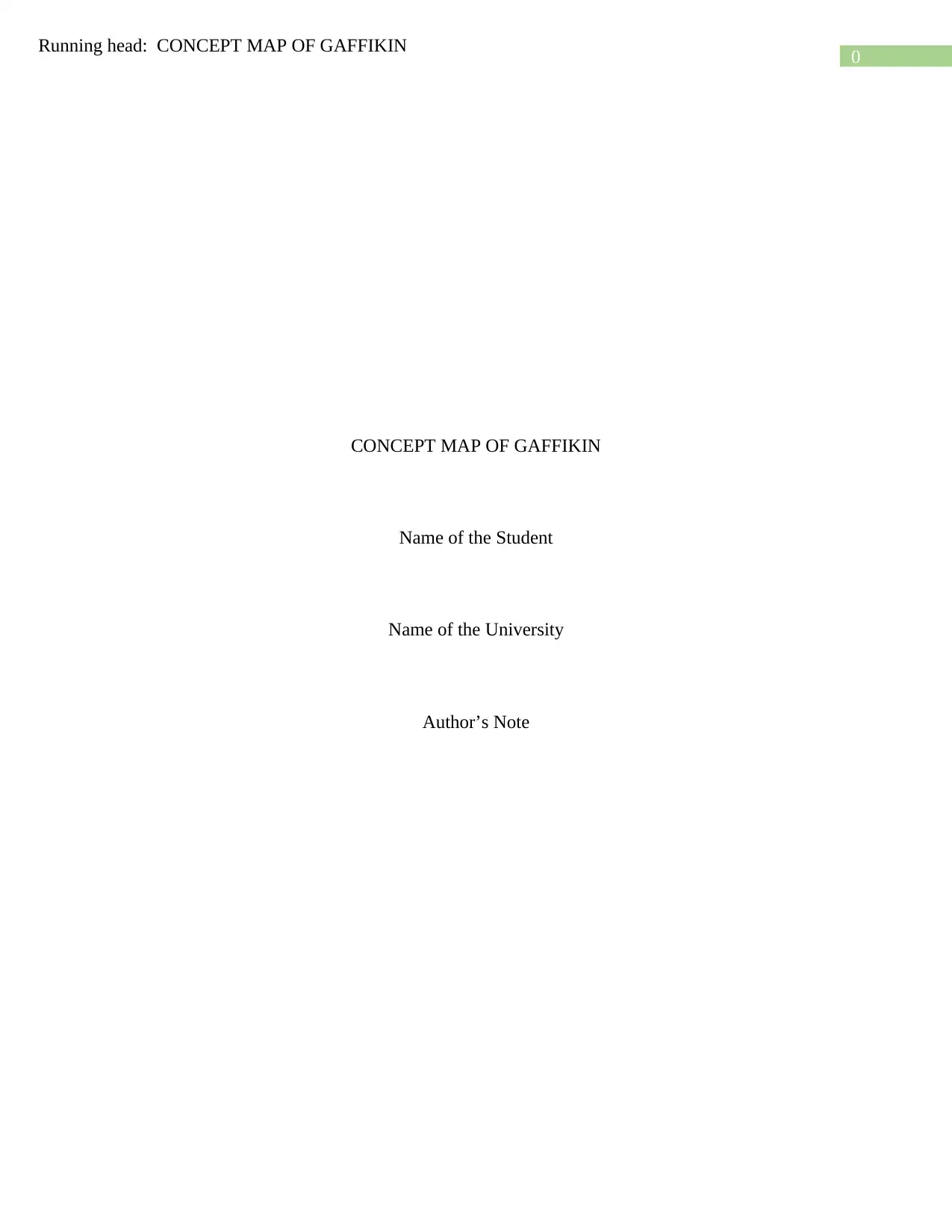
0
Running head: CONCEPT MAP OF GAFFIKIN
CONCEPT MAP OF GAFFIKIN
Name of the Student
Name of the University
Author’s Note
Running head: CONCEPT MAP OF GAFFIKIN
CONCEPT MAP OF GAFFIKIN
Name of the Student
Name of the University
Author’s Note
Paraphrase This Document
Need a fresh take? Get an instant paraphrase of this document with our AI Paraphraser
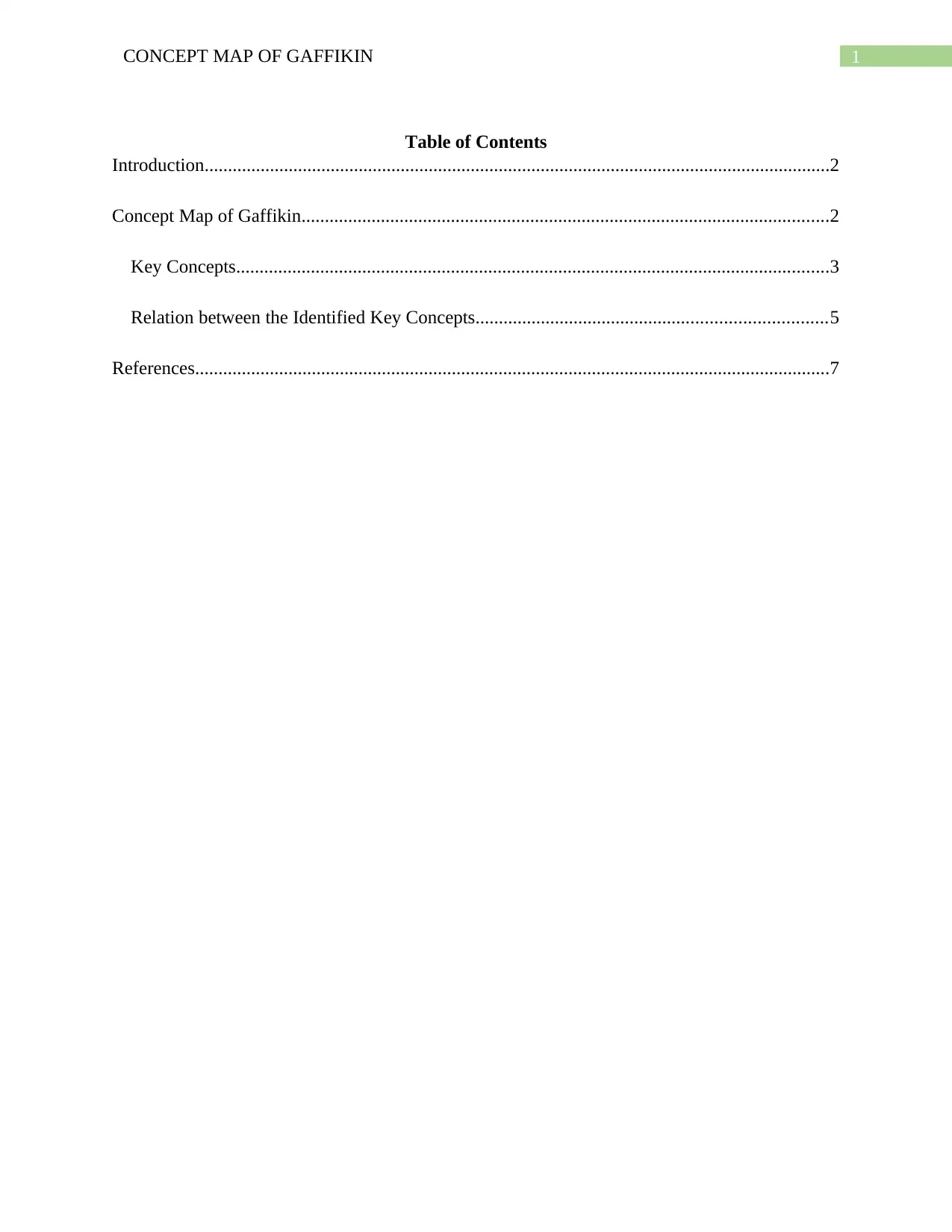
1CONCEPT MAP OF GAFFIKIN
Table of Contents
Introduction......................................................................................................................................2
Concept Map of Gaffikin.................................................................................................................2
Key Concepts...............................................................................................................................3
Relation between the Identified Key Concepts...........................................................................5
References........................................................................................................................................7
Table of Contents
Introduction......................................................................................................................................2
Concept Map of Gaffikin.................................................................................................................2
Key Concepts...............................................................................................................................3
Relation between the Identified Key Concepts...........................................................................5
References........................................................................................................................................7
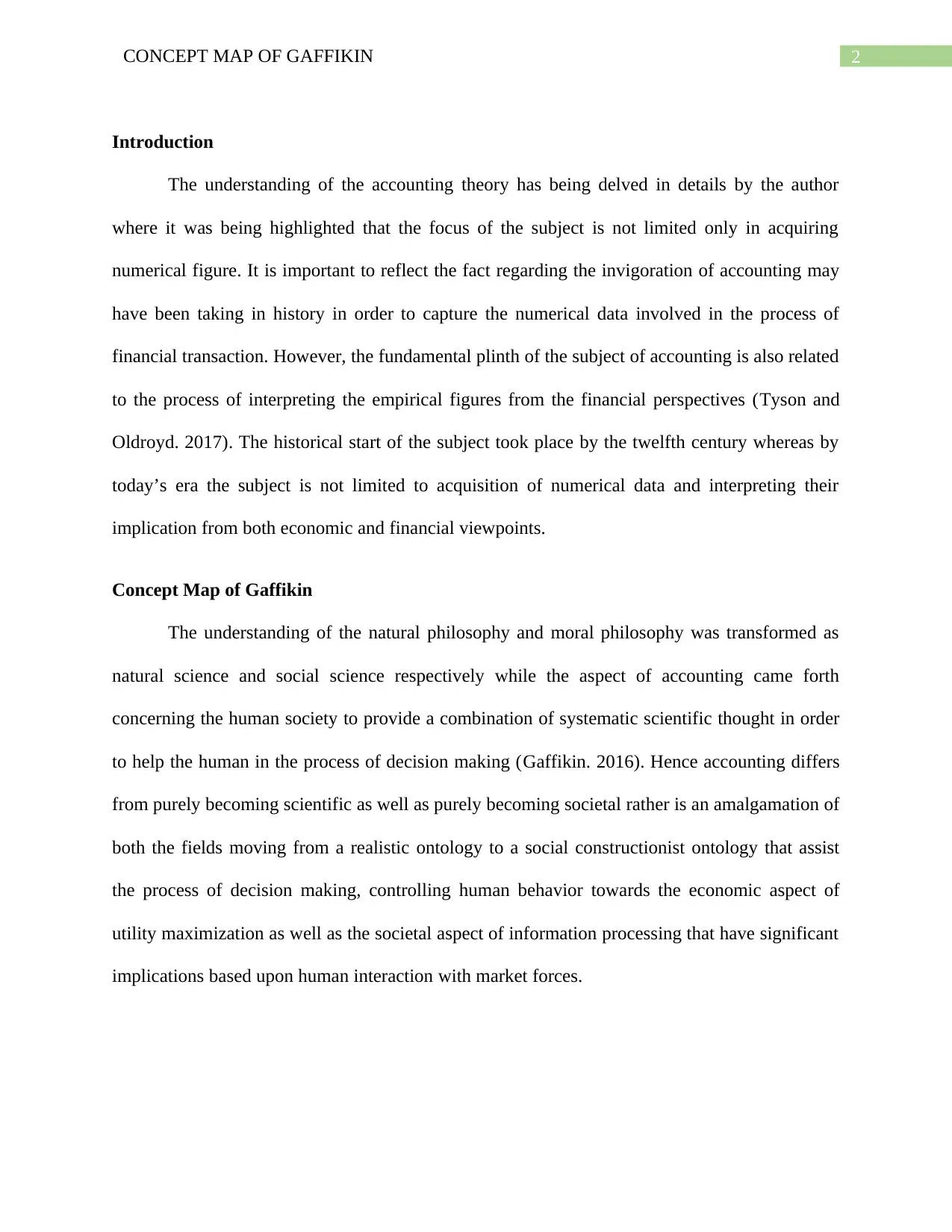
2CONCEPT MAP OF GAFFIKIN
Introduction
The understanding of the accounting theory has being delved in details by the author
where it was being highlighted that the focus of the subject is not limited only in acquiring
numerical figure. It is important to reflect the fact regarding the invigoration of accounting may
have been taking in history in order to capture the numerical data involved in the process of
financial transaction. However, the fundamental plinth of the subject of accounting is also related
to the process of interpreting the empirical figures from the financial perspectives (Tyson and
Oldroyd. 2017). The historical start of the subject took place by the twelfth century whereas by
today’s era the subject is not limited to acquisition of numerical data and interpreting their
implication from both economic and financial viewpoints.
Concept Map of Gaffikin
The understanding of the natural philosophy and moral philosophy was transformed as
natural science and social science respectively while the aspect of accounting came forth
concerning the human society to provide a combination of systematic scientific thought in order
to help the human in the process of decision making (Gaffikin. 2016). Hence accounting differs
from purely becoming scientific as well as purely becoming societal rather is an amalgamation of
both the fields moving from a realistic ontology to a social constructionist ontology that assist
the process of decision making, controlling human behavior towards the economic aspect of
utility maximization as well as the societal aspect of information processing that have significant
implications based upon human interaction with market forces.
Introduction
The understanding of the accounting theory has being delved in details by the author
where it was being highlighted that the focus of the subject is not limited only in acquiring
numerical figure. It is important to reflect the fact regarding the invigoration of accounting may
have been taking in history in order to capture the numerical data involved in the process of
financial transaction. However, the fundamental plinth of the subject of accounting is also related
to the process of interpreting the empirical figures from the financial perspectives (Tyson and
Oldroyd. 2017). The historical start of the subject took place by the twelfth century whereas by
today’s era the subject is not limited to acquisition of numerical data and interpreting their
implication from both economic and financial viewpoints.
Concept Map of Gaffikin
The understanding of the natural philosophy and moral philosophy was transformed as
natural science and social science respectively while the aspect of accounting came forth
concerning the human society to provide a combination of systematic scientific thought in order
to help the human in the process of decision making (Gaffikin. 2016). Hence accounting differs
from purely becoming scientific as well as purely becoming societal rather is an amalgamation of
both the fields moving from a realistic ontology to a social constructionist ontology that assist
the process of decision making, controlling human behavior towards the economic aspect of
utility maximization as well as the societal aspect of information processing that have significant
implications based upon human interaction with market forces.
You're viewing a preview
Unlock full access by subscribing today!

3CONCEPT MAP OF GAFFIKIN
Key Concepts
Figure 1: Subjectivity versus Objectivity
From social perspective accounting takes under consideration the interested endeavor of
the human endeavors and understanding their economic reality rather than only getting restricted
in the technical domain (Cortese and Wright. 2018). Moreover, accounting is also concerned
with the viability of the financial reporting of the major institutional economies and
predominantly gives focus upon the standardization of the financial feasibility that can avoid all
sorts of anomalies that may get occurred if significantly the accounting aspects of the financial
transaction and information exchange are not taken under consideration. These provides a
reorientation of the corporate management responsibility that goes beyond the satisfaction level
of the stockholder’s interest as well as paramountcy of the ownership’s interests. The crafts in
the process to channelize the dilemma that societal problems gets confronted with requires
effective accountability of the information and not only had the data that are being found related
to the problem (Gaffikin. 2016). The naïve assumptions of the efficient market or the value free
propositions are tested to their limits in order to assess that it should not hinder the usefulness of
the neo-empirical approach of the financial statements.
Key Concepts
Figure 1: Subjectivity versus Objectivity
From social perspective accounting takes under consideration the interested endeavor of
the human endeavors and understanding their economic reality rather than only getting restricted
in the technical domain (Cortese and Wright. 2018). Moreover, accounting is also concerned
with the viability of the financial reporting of the major institutional economies and
predominantly gives focus upon the standardization of the financial feasibility that can avoid all
sorts of anomalies that may get occurred if significantly the accounting aspects of the financial
transaction and information exchange are not taken under consideration. These provides a
reorientation of the corporate management responsibility that goes beyond the satisfaction level
of the stockholder’s interest as well as paramountcy of the ownership’s interests. The crafts in
the process to channelize the dilemma that societal problems gets confronted with requires
effective accountability of the information and not only had the data that are being found related
to the problem (Gaffikin. 2016). The naïve assumptions of the efficient market or the value free
propositions are tested to their limits in order to assess that it should not hinder the usefulness of
the neo-empirical approach of the financial statements.
Paraphrase This Document
Need a fresh take? Get an instant paraphrase of this document with our AI Paraphraser
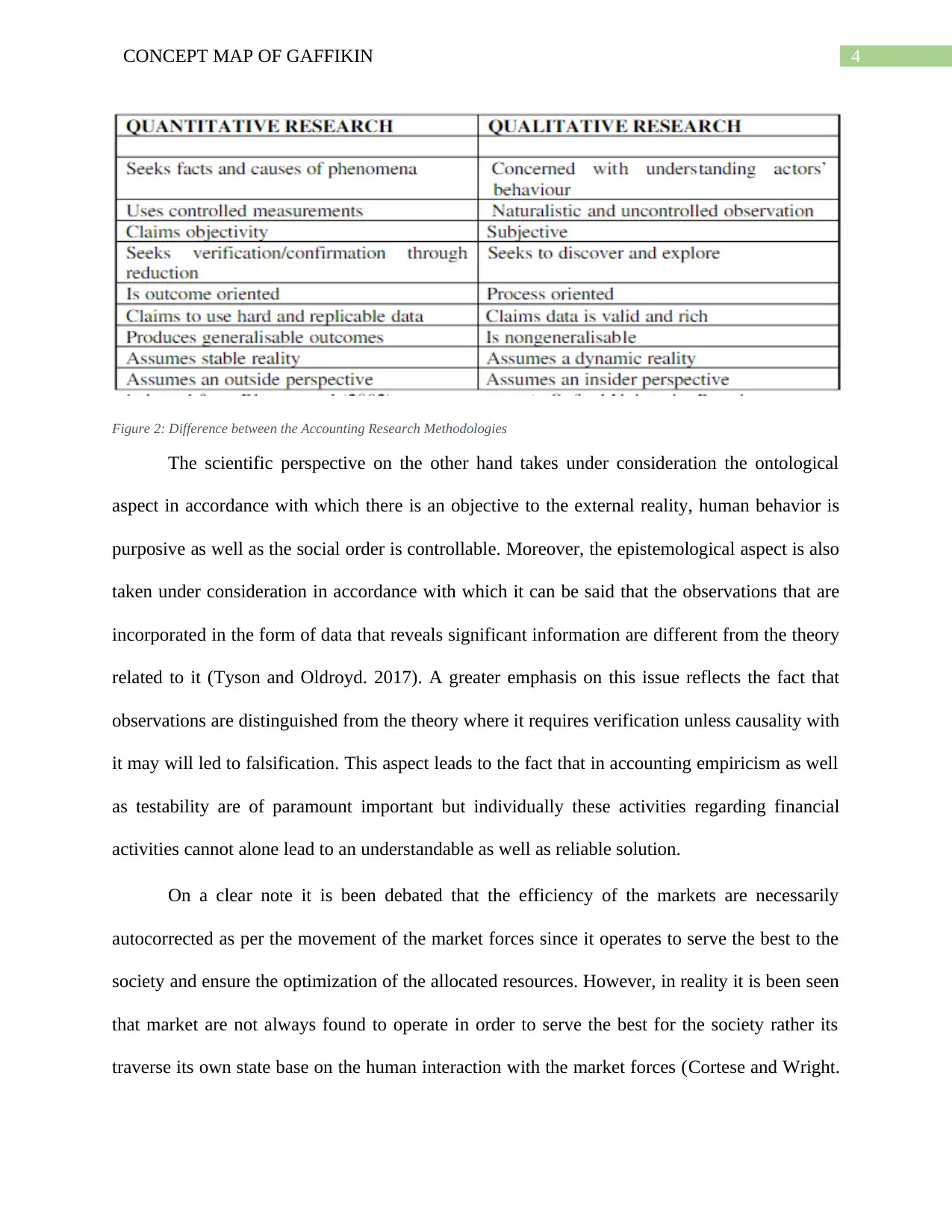
4CONCEPT MAP OF GAFFIKIN
Figure 2: Difference between the Accounting Research Methodologies
The scientific perspective on the other hand takes under consideration the ontological
aspect in accordance with which there is an objective to the external reality, human behavior is
purposive as well as the social order is controllable. Moreover, the epistemological aspect is also
taken under consideration in accordance with which it can be said that the observations that are
incorporated in the form of data that reveals significant information are different from the theory
related to it (Tyson and Oldroyd. 2017). A greater emphasis on this issue reflects the fact that
observations are distinguished from the theory where it requires verification unless causality with
it may will led to falsification. This aspect leads to the fact that in accounting empiricism as well
as testability are of paramount important but individually these activities regarding financial
activities cannot alone lead to an understandable as well as reliable solution.
On a clear note it is been debated that the efficiency of the markets are necessarily
autocorrected as per the movement of the market forces since it operates to serve the best to the
society and ensure the optimization of the allocated resources. However, in reality it is been seen
that market are not always found to operate in order to serve the best for the society rather its
traverse its own state base on the human interaction with the market forces (Cortese and Wright.
Figure 2: Difference between the Accounting Research Methodologies
The scientific perspective on the other hand takes under consideration the ontological
aspect in accordance with which there is an objective to the external reality, human behavior is
purposive as well as the social order is controllable. Moreover, the epistemological aspect is also
taken under consideration in accordance with which it can be said that the observations that are
incorporated in the form of data that reveals significant information are different from the theory
related to it (Tyson and Oldroyd. 2017). A greater emphasis on this issue reflects the fact that
observations are distinguished from the theory where it requires verification unless causality with
it may will led to falsification. This aspect leads to the fact that in accounting empiricism as well
as testability are of paramount important but individually these activities regarding financial
activities cannot alone lead to an understandable as well as reliable solution.
On a clear note it is been debated that the efficiency of the markets are necessarily
autocorrected as per the movement of the market forces since it operates to serve the best to the
society and ensure the optimization of the allocated resources. However, in reality it is been seen
that market are not always found to operate in order to serve the best for the society rather its
traverse its own state base on the human interaction with the market forces (Cortese and Wright.
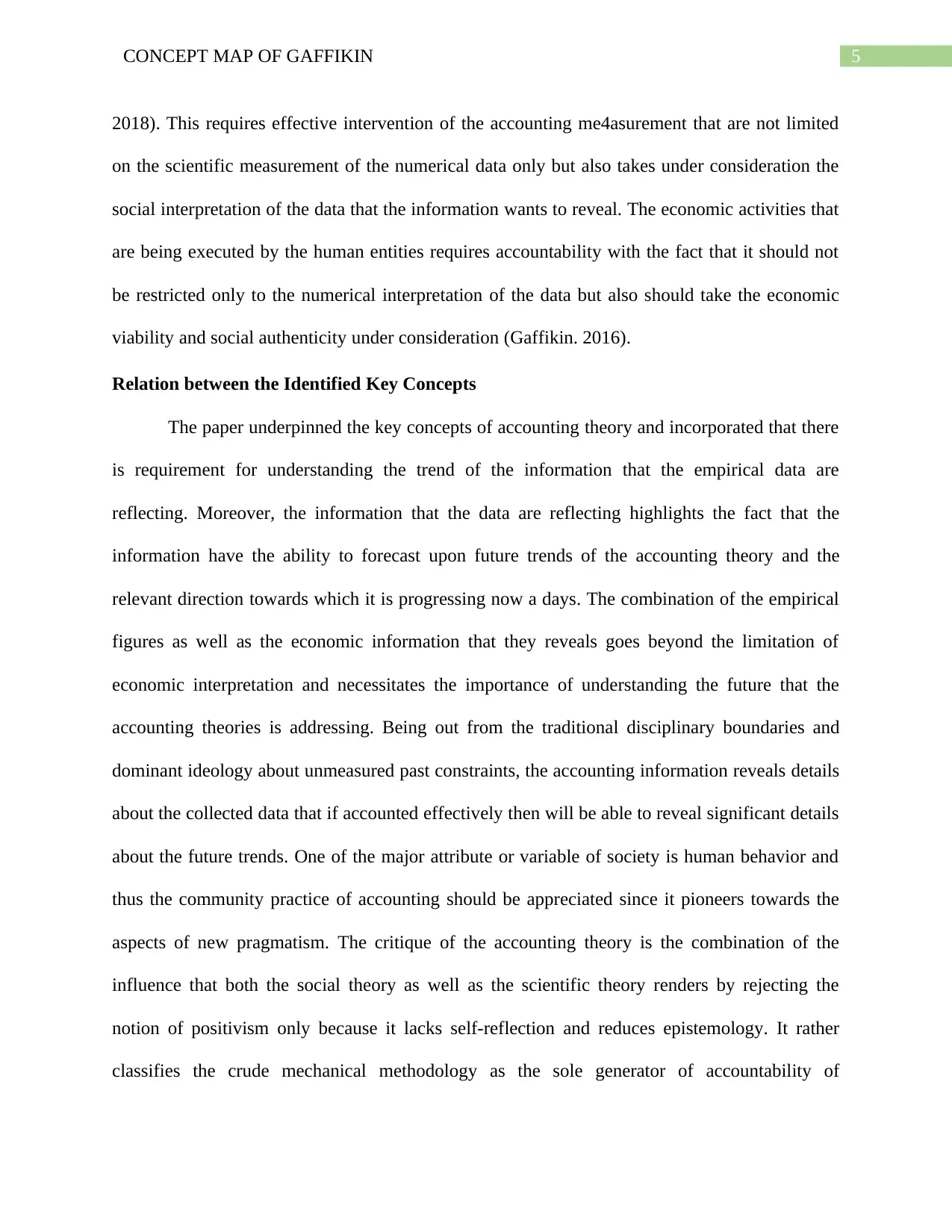
5CONCEPT MAP OF GAFFIKIN
2018). This requires effective intervention of the accounting me4asurement that are not limited
on the scientific measurement of the numerical data only but also takes under consideration the
social interpretation of the data that the information wants to reveal. The economic activities that
are being executed by the human entities requires accountability with the fact that it should not
be restricted only to the numerical interpretation of the data but also should take the economic
viability and social authenticity under consideration (Gaffikin. 2016).
Relation between the Identified Key Concepts
The paper underpinned the key concepts of accounting theory and incorporated that there
is requirement for understanding the trend of the information that the empirical data are
reflecting. Moreover, the information that the data are reflecting highlights the fact that the
information have the ability to forecast upon future trends of the accounting theory and the
relevant direction towards which it is progressing now a days. The combination of the empirical
figures as well as the economic information that they reveals goes beyond the limitation of
economic interpretation and necessitates the importance of understanding the future that the
accounting theories is addressing. Being out from the traditional disciplinary boundaries and
dominant ideology about unmeasured past constraints, the accounting information reveals details
about the collected data that if accounted effectively then will be able to reveal significant details
about the future trends. One of the major attribute or variable of society is human behavior and
thus the community practice of accounting should be appreciated since it pioneers towards the
aspects of new pragmatism. The critique of the accounting theory is the combination of the
influence that both the social theory as well as the scientific theory renders by rejecting the
notion of positivism only because it lacks self-reflection and reduces epistemology. It rather
classifies the crude mechanical methodology as the sole generator of accountability of
2018). This requires effective intervention of the accounting me4asurement that are not limited
on the scientific measurement of the numerical data only but also takes under consideration the
social interpretation of the data that the information wants to reveal. The economic activities that
are being executed by the human entities requires accountability with the fact that it should not
be restricted only to the numerical interpretation of the data but also should take the economic
viability and social authenticity under consideration (Gaffikin. 2016).
Relation between the Identified Key Concepts
The paper underpinned the key concepts of accounting theory and incorporated that there
is requirement for understanding the trend of the information that the empirical data are
reflecting. Moreover, the information that the data are reflecting highlights the fact that the
information have the ability to forecast upon future trends of the accounting theory and the
relevant direction towards which it is progressing now a days. The combination of the empirical
figures as well as the economic information that they reveals goes beyond the limitation of
economic interpretation and necessitates the importance of understanding the future that the
accounting theories is addressing. Being out from the traditional disciplinary boundaries and
dominant ideology about unmeasured past constraints, the accounting information reveals details
about the collected data that if accounted effectively then will be able to reveal significant details
about the future trends. One of the major attribute or variable of society is human behavior and
thus the community practice of accounting should be appreciated since it pioneers towards the
aspects of new pragmatism. The critique of the accounting theory is the combination of the
influence that both the social theory as well as the scientific theory renders by rejecting the
notion of positivism only because it lacks self-reflection and reduces epistemology. It rather
classifies the crude mechanical methodology as the sole generator of accountability of
You're viewing a preview
Unlock full access by subscribing today!

6CONCEPT MAP OF GAFFIKIN
information and interpretable data raising its reliability and predictability unless and until it
possess high feasibility with respect to the society.
information and interpretable data raising its reliability and predictability unless and until it
possess high feasibility with respect to the society.
Paraphrase This Document
Need a fresh take? Get an instant paraphrase of this document with our AI Paraphraser
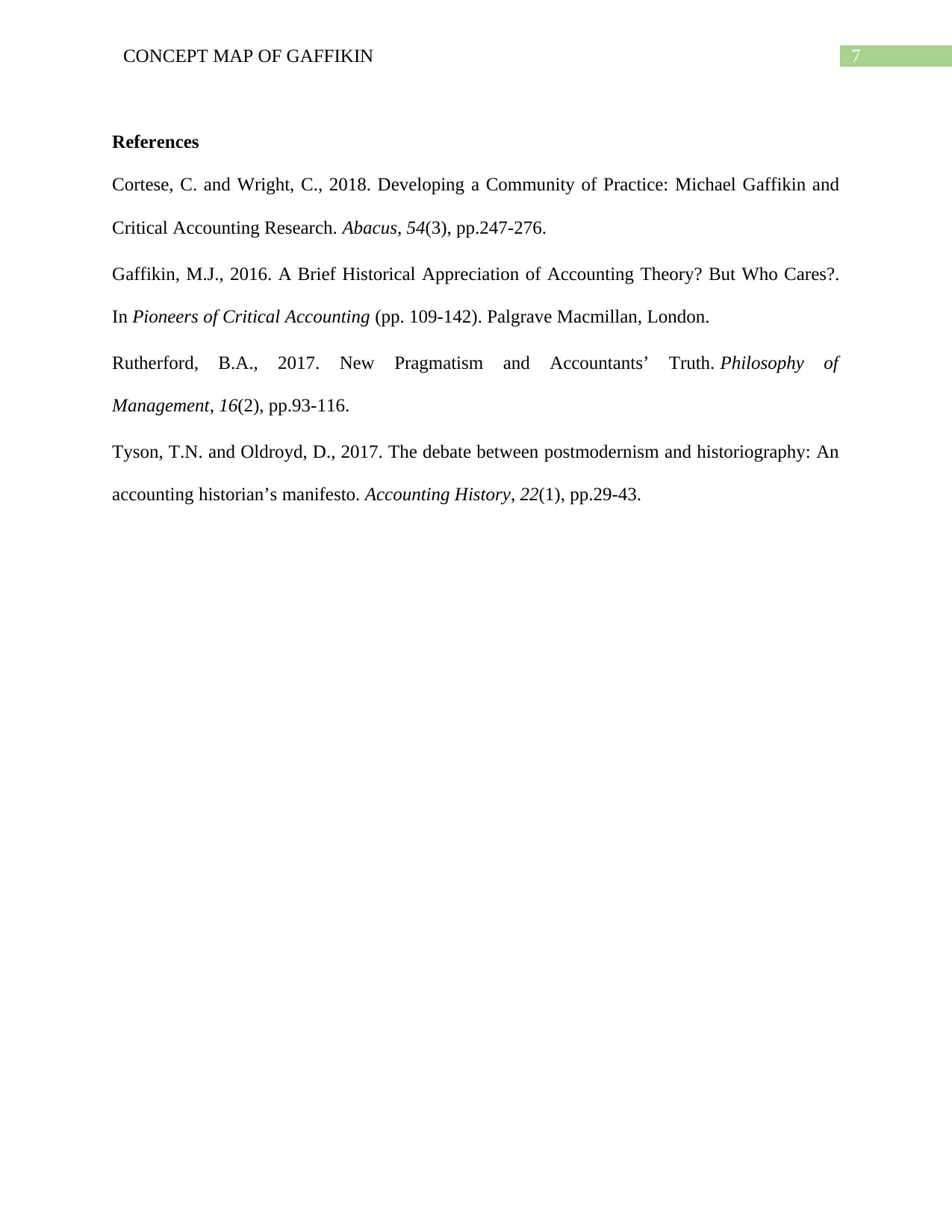
7CONCEPT MAP OF GAFFIKIN
References
Cortese, C. and Wright, C., 2018. Developing a Community of Practice: Michael Gaffikin and
Critical Accounting Research. Abacus, 54(3), pp.247-276.
Gaffikin, M.J., 2016. A Brief Historical Appreciation of Accounting Theory? But Who Cares?.
In Pioneers of Critical Accounting (pp. 109-142). Palgrave Macmillan, London.
Rutherford, B.A., 2017. New Pragmatism and Accountants’ Truth. Philosophy of
Management, 16(2), pp.93-116.
Tyson, T.N. and Oldroyd, D., 2017. The debate between postmodernism and historiography: An
accounting historian’s manifesto. Accounting History, 22(1), pp.29-43.
References
Cortese, C. and Wright, C., 2018. Developing a Community of Practice: Michael Gaffikin and
Critical Accounting Research. Abacus, 54(3), pp.247-276.
Gaffikin, M.J., 2016. A Brief Historical Appreciation of Accounting Theory? But Who Cares?.
In Pioneers of Critical Accounting (pp. 109-142). Palgrave Macmillan, London.
Rutherford, B.A., 2017. New Pragmatism and Accountants’ Truth. Philosophy of
Management, 16(2), pp.93-116.
Tyson, T.N. and Oldroyd, D., 2017. The debate between postmodernism and historiography: An
accounting historian’s manifesto. Accounting History, 22(1), pp.29-43.
1 out of 8
Your All-in-One AI-Powered Toolkit for Academic Success.
+13062052269
info@desklib.com
Available 24*7 on WhatsApp / Email
![[object Object]](/_next/static/media/star-bottom.7253800d.svg)
Unlock your academic potential
© 2024 | Zucol Services PVT LTD | All rights reserved.